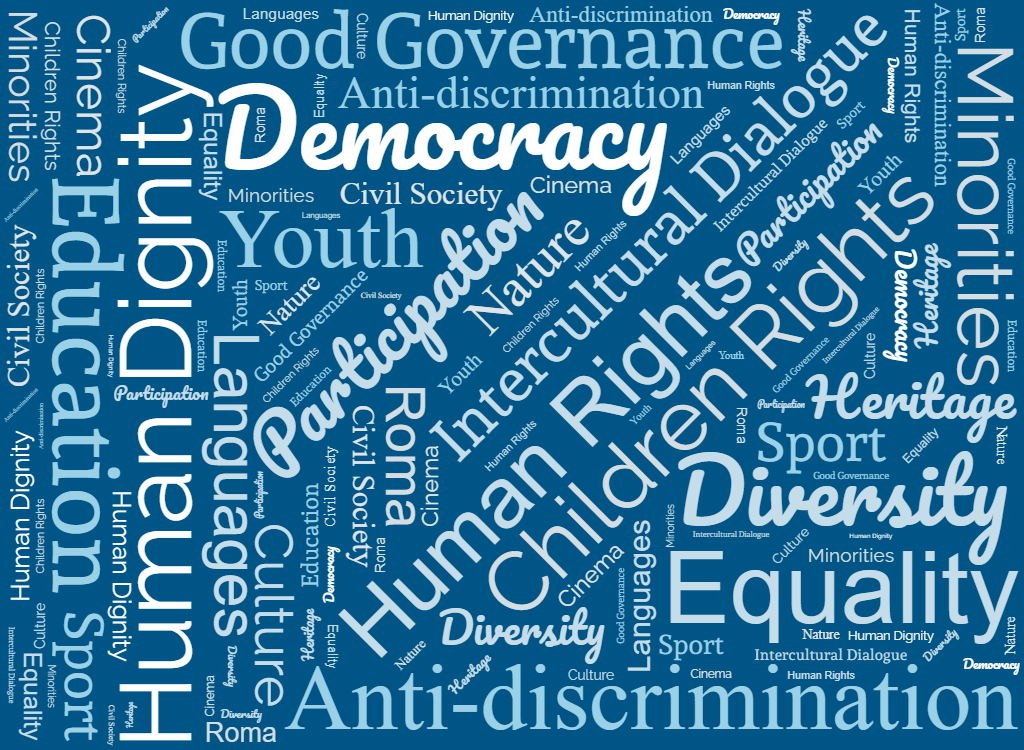Directorate for Democracy
On the basis of the Reykjavik Declaration, the new Directorate for Democracy brings together the Council of Europe activities to strengthen the resilience of our democracies through education, youth participation, culture and heritage policies and sport, and the strengthening of democratic governance and democratic checks and balances by supporting media freedom, safety of journalists, protection of civic space and the engagement with the civil society.
A number of Partial Agreements also contribute to strengthening member States’ commitment in these areas.
 Democratic institutions and Freedoms Department
Democratic institutions and Freedoms Department
We pursue a comprehensive approach to strengthening democracy and fighting backsliding line with the commitment of the Heads of State and Government states at the 4th Council of Europe Summit in Reykjavik in May 2023.
- Our new intergovernmental committee on democracy (CDDEM) will review existing standards with reference to the Reykjavik Principles of Democracy*, address normative gaps and propose action to brace democratic institutions and freedoms, including through bilateral and multilateral cooperation projects, and in partnership with the Schools of political Studies which train young democratic leaders.
- The World Forum for democracy, held annually in Strasbourg, will serve as a sounding board for innovative initiatives to renew and strengthen democracy throughout the world.
- The work of the Committee on media and information society (CDMSI) will focus on freedom of expression in the information age and the safety of both online content users and media professionals, proposing policy measures regarding threats signaled by the Platform for the protection of journalism and safety of journalists. In addition, our cooperation projects will provide support for the improvement of policies, legislation, structures and capacities in the area of freedom of expression, media, and access to information.
- Promoting democratic values and civic engagement through culture and heritage, will be the tasks of the Committee on culture, heritage and landscape (CDCPP). The EPA on Cultural Routes will continue to fortify the potential of Cultural Routes for fostering cultural cooperation, sustainable territorial development, and social cohesion.
 Education Department
Education Department
- Our citizenship and human rights education tools and programmes help individuals acquire the attitudes, skills, values, critical understanding and knowledge required to participate in democratic society, both on and off-line.
- We promote inclusive, quality education for all.
- We facilitate the integration of refugees and migrants, including with tools to recognise their qualifications and to teach them the language of their host country.
- We work to combat cross-border and institutional fraud and corruption in education, particularly in higher education.
- We support whole-school approaches to building democracy through education, providing materials for educators, parents and students.
 Youth department
Youth department
- We empower young people to access their human rights – facilitating their autonomy and participation – and help our member states develop the requisite youth policies.
- We support young people who are active in civil society and work with them on how to combat discrimination and exclusion.
- Each year our European Youth Centres in Strasbourg and Budapest host over 10,000 participants in a variety of activities and the European Youth Foundation disburses over €4m to youth organisations.
 Partial Agreements
Partial Agreements
- European Centre for Modern Languages (Graz, Austria)
The ECML promotes reform and best practice in the teaching and learning of languages, including through teacher training and the publication of materials for educators. - Partial Agreement on Youth Mobility through the Youth Card
Over four million young people have a European Youth Card, which contributes to their social, cultural, educational and economic mobility. The card gives advantages/discounts on transport, accommodation, language courses and cultural activities. - Cultural Routes (Luxembourg)
More than 30 Cultural Routes cross the whole of Europe, promoting mutual understanding and an appreciation of European history, identity and diversity. - Eurimages
Eurimages promotes European co-operation and diversity by supporting quality films produced by professionals from different European countries. More than 60 co-productions have won prestigious awards. - Observatory on History Teaching in Europe (OHTE)
The OHTE provides an opportunity to share good practices and experiences between the member States of the enlarged partial agreement and reinforce co-operation in the field of history education at the European level. - European Audiovisual Observatory
The European Audiovisual Observatory has been collecting and distributing information about the audiovisual industry in Europe. This Partial and Enlarged Agreement with its own budget aims at promoting greater transparency and a clearer understanding of the functioning of the audiovisual industry in Europe from an economic and legal point of view.



